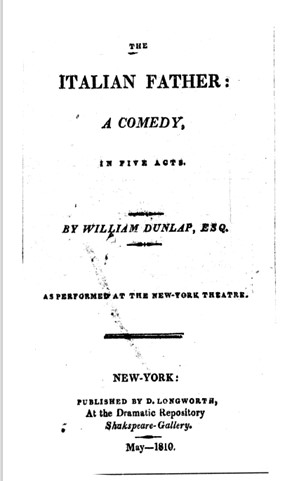"All the World's a Stage": Highlights from The American Stage to 1819
“All the world’s a stage, and all the men and women merely players.” As You Like It by William Shakespeare.
Shakespeare’s influence over theater and literature far exceeded the borders of Europe and found new life in the early American colonies. In fact, theater was seen as such a British import that several states including Pennsylvania, Rhode Island, and Massachusetts banned it under pressure from the Continental Congress during the Revolutionary War years.
In 1785, two years after the Revolutionary War ended, John Durang began his acting career by joining the Old American Company. He was said to be one of George Washington’s favorite performers. Considered the first native-born American dancer, Durang was made famous by dancing the hornpipe. In this playbill from 1795 for a benefit performance it states,
End of Act 2d, a SAILOR’s HORNPIPE, by Mr. DURANG.

He is also listed as playing “Lord Burleigh” in The Critic: or, A Tragedy Rehears’d, a satire penned by British playwright Richard Brinsley Sheridan.
Another famous performer who was working to make a name for herself was Elizabeth (Eliza) Arnold Poe, actress and mother of iconic American writer Edgar Allan Poe. Elizabeth began her stage career at a young age and can be seen in earlier works billed as Miss Arnold. This playbill from 1809 was presented only a few months after Edgar was born. The bill advertises,
Mrs Poe’s benefit: Mrs Poe, respectfully informs the public, that in consequence of repeated disappointments in obtaining places during Master Payne’s engagement, he has consented to play one night longer, at her benefit.

Eliza and Payne both performed in Romeo and Juliet around that same time. Payne went on to have a legendary theater career. Eliza died in 1811, when her son was only three years old. Her death inspired many of his later works.
No one carried the mantel of “Father of American Theater” like William Dunlap. Dunlap, a producer, playwright, actor, and theater historian, penned A History of the American Theatre in two volumes in 1832. However, he is best known for his encyclopedic three-volume History of the Rise and Progress of the Arts of Design in the United States, which was published in 1834 and is now an invaluable source of information about artists, collectors, and artistic life in the colonial and federal periods. A portrait of George Washington, completed by Dunlap himself, is currently held by the U.S. Senate.
Dunlap’s play, The Italian Father: A Comedy in Five Acts is considered by many to be his best work. First performed in New York City in 1799, it wasn’t published until 1810.

Although most of the over sixty plays he produced in his lifetime were adaptations, Dunlap was a driving force in bringing American themes and characters to the stage. In addition to his many artistic contributions, he managed two of New York City’s earliest and most prominent theaters; the John Street Theatre, which is often called “The Birthplace of American Theatre,” and the Park Theatre, that he attempted to keep afloat as the sole proprietor after the other managers had jumped ship. He maintained it for an additional seven years before he went bankrupt and was forced to sell in 1805.
This collection has much more to discover from the first professionally performed play in the U.S., The Prince of Parthia, in 1767 to the first play published by an American publisher, Androboros, in 1714. With thousands of unique documents to explore there is plenty to be discovered.
Visit the Readex The American Stage to 1819 page for more information about making this collection available at your institution.



